Top Titles From Portugal at Annecy, from Milestones to Stunning 2D and a Vibrant New Generation With Attitude and High Art
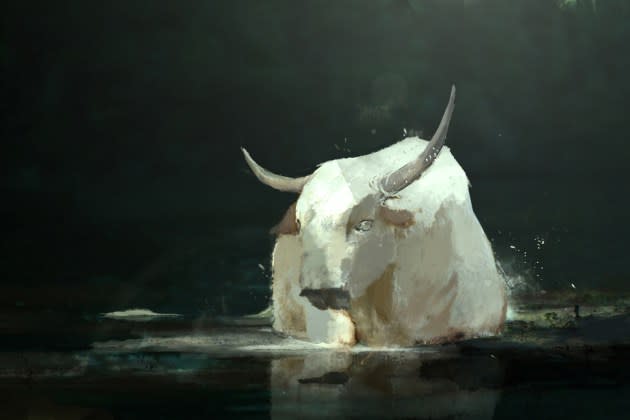
As ever more Portuguese directors plan their first animated feature, Annecy is staging a timely Tribute to Portuguese Animation, its 2024 Country of Honor, with a seven section spread of key titles.
Variety has made its own selection of that selection, profiling modern milestones such as Abi Feijo’s “The Outlaws” and José Miguel Ribeiro’s “The Suspect” and taking in Regina Pessoa’s “Uncle Thomas, Accounting for the Days,” the dazzling 2D of BAP, Zagreb Animafest winner “The Garbage Man” and Oscar-nominated ‘Ice Merchants.”
More from Variety
There’s a larger narrative to the titles: the step-by-step and very often collaborative growth of a craft industry of social point and high artistic ambition prized at home and ever more abroad.
As multiple leading lights of the Portugal’s animation industry contemplate feature film creation, Annecy’s Tribute is a reminder of what Portugal has already achieved.
Some highlights:
“Ice Merchants,” (João Gonzalez, 2022)
Portugal’s first ever Oscar nominee, in any category. Every day a father and son parachute from a rickety house suspended by pulleys above the vertigo-inducing abyss of an icy cliff in order to sell ice to a village thousands of feet below. Painterly in palette, with a great sound design and superbly scored by Gonzalez, an edge-of-the-seat thriller whose real triumph is its heartrending tale of loss and the saving grace of family love. Produced by Bruno Caetano at Coletivo Audiovisual (COLA), the Royal College of Art and Michaël Proença at Wildstream.
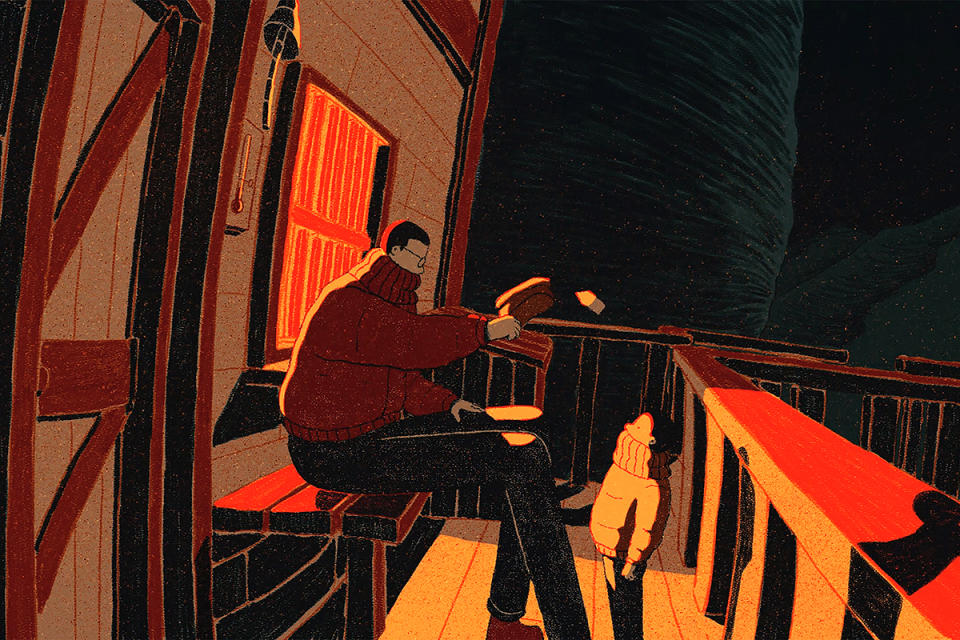
“The Outlaws,” (Abi Feijó, 1993)
If modern Portuguese animation lifts off, it is most probably with Feijó’s “The Outlaws,” a Special Jury Award winner at 1994’s Cartoon d’Or. A fully developed narrative – a Feijó hallmark – brooding orchestral score and flickering black and white drawing on paper compose a film noir of large political point about Portugal and Spain’s own 1940s crime world. Here that means Portugal’s illicit part in the slaughter of Republic renegades caught hiding in border mountains after defeat in the Civil War. A bracing modern classic.
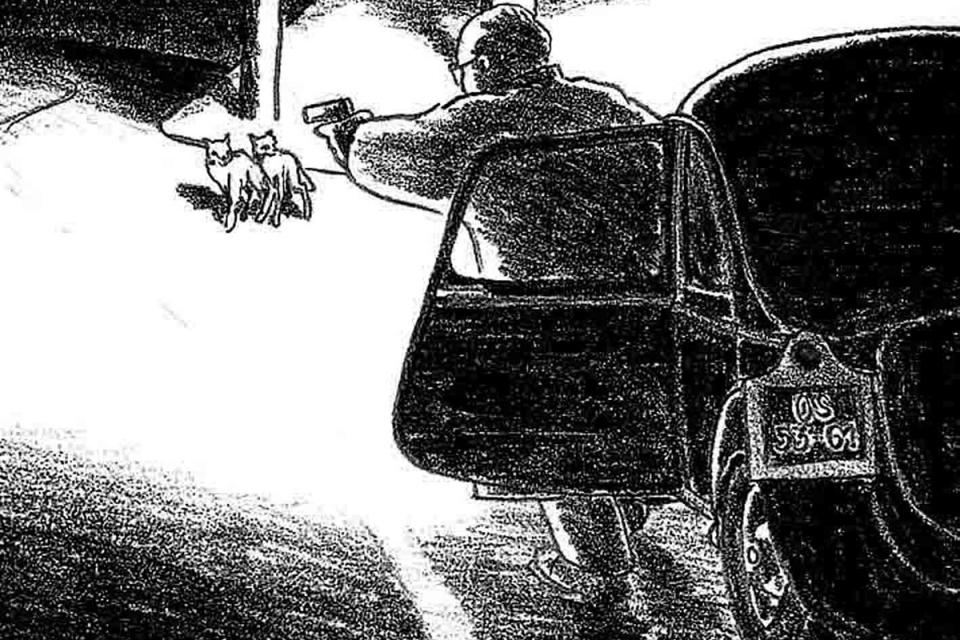
“Tale of the Cat and the Moon,” (Pedro Serrazina, 1995)
Serrazina’s first short and another early modern title which helped put Portugal on the international map, proving a major hit abroad after screening in competition at Cannes in 1996. The tale of a cat enchanted by an ever elusive moon is drawn in inspired black and white with sharp light, dark shadows and swirling figures, the tale capped by a dreams-can-come-true ending. Produced by Abi Feijó’s Filmógrafo.
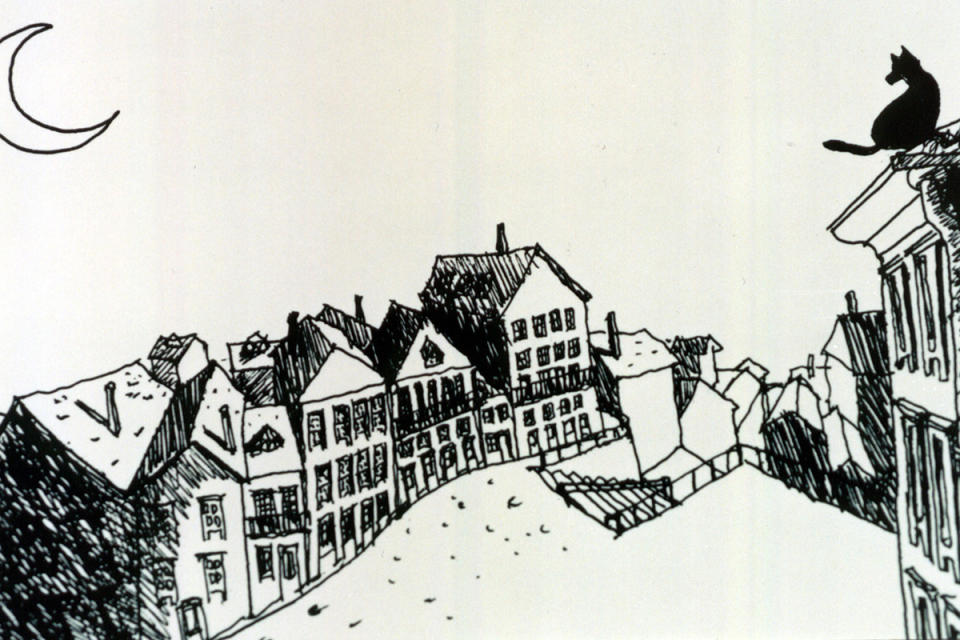
“The Suspect,” (“A Suspeita,” José Miguel Ribeiro, 1999)
Another modern milestone in Portuguese animation. Four figures share a train compartment on a slow trip through picturesque hills. But “Train Killer” is on the loose, one occupant reads in his newspaper, and he fears he’s one of the occupants. A stop-motion comedy sluiced with Hitchcockian suspense and humor which won a 2000 Cartoon d’Or and made the reputation of Ribeiro, one of Portuguese animation’s modern – and most stylistically eclectic – greats. Ahead, his love affair with Africa, expressed in travel memoir “A Journey to Cape Verde” (2010), an island road movie of self discovery, and Angola-set Annecy animated feature hit “Nayola” (2022).
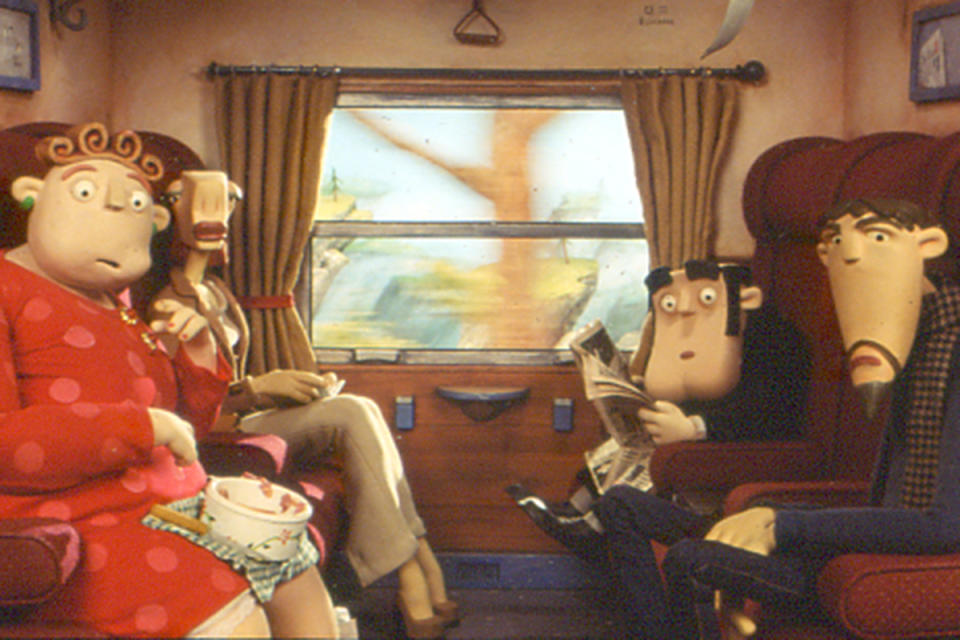
“Tragic Story With Happy Ending,” (Regina Pessoa, 2005)
A Crystal Award winner at Annecy, going on to become the most multi-prized film in Portuguese history. Pessoa used photocopies with images scratched into India ink on glossy paper to create this short’s aesthetic. It’s a story of acceptance, by oneself and one’s community, as we track a girl with a heartbeat too loud for everyone. Believing she has the heart of a bird, she longs to take flight as the individual she truly is. The middle child of Pessoa’s trilogy on childhood which began with “A noite” and was completed by the Christopher Plummer-narrated “Kali the Little Vampire.”

“Uncle Thomas, Accounting for the Days,” (Regina Pessoa, 2018)
A 2019 Annecy Jury Award winner, and the crowning triumph – to date – for Pessoa, creator of this year’s Annecy poster, the godmother of MIFA campus and Masterclass speaker as part of the Portuguese Animation Country of Honor. Exacting in its style – adding stop motion to her traditional 2D and a sense of engraving – “Uncle Thomas,” is, however, initially personal in inspiration, a tribute to Pessoa’s own uncle who suffered some form of OCD but nevertheless lit in her love of drawing. A deeply moving homage.
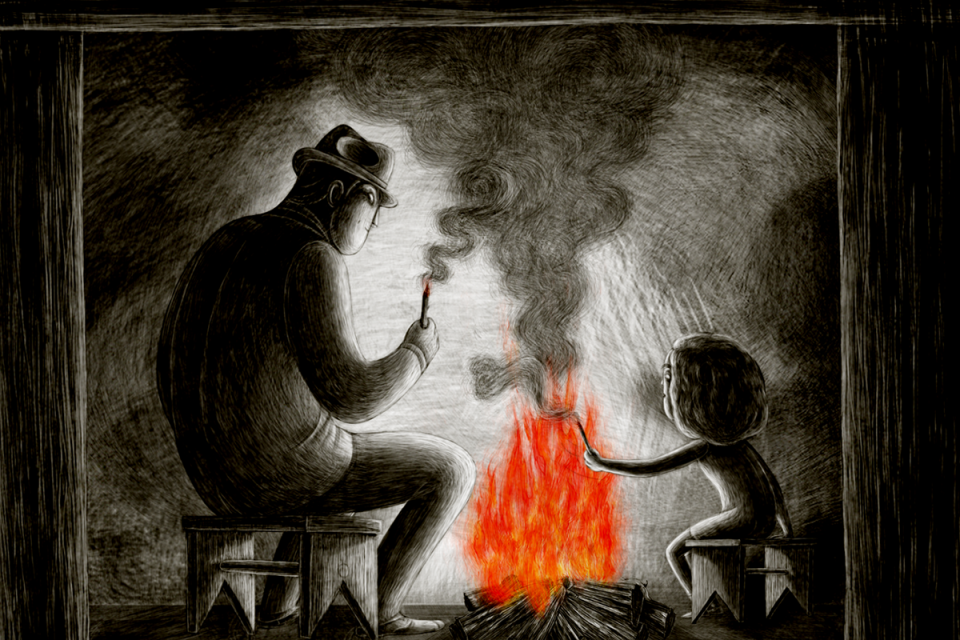
“Augur,” (David Doutel, Vasco Sá, 2018)
Over the last 20 years, there has been no more fertile breeding ground for young Portuguese animation talent than Bando À Parte, set up in 2011, and co-operative BAP Animation Studio, launched in 2018. Via them Doutel and Sá have produced a significant number of the shorts featured at Annecy’s Portugal County of Honor Tribute. They are also, however, directors of four shorts, three at Annecy: 2014’s “Soot,” 2018’s “Augur” and 2022’s “Garrano.” 2D shorts of often stunning beauty, they are also psychological dramas offering memorable portraits of male loss, hopelessness and callousness, set in the context of Northern Portugal.
“The Garbage Man,” (Laura Gonçalves, 2022)
A 2022 Zagreb Animafest top prize winner, taking one of the most coveted prizes on the international animation scene. A family gathers around an enormous table, eat and drink and remember the figure of Uncle Manel Botão. Forced by poverty to emigrate to Paris, he would collect almost new trash for his family in Portugal: a set of crystal glasses, lamps, a bicycle, even a hand-held electric scythe. Animated in shimmering 2D, this is a homage to a man, but very much more a celebration of collectivity, from the portrait of Botão, with multiple family members adding shared memories, to the rambunctious band beginning and ending the short to the very way the film was made, invoking many of Portugal’s good and great animators in multiple labors. Produced by Bando À Parte, with the support of BAP Animation Studios.
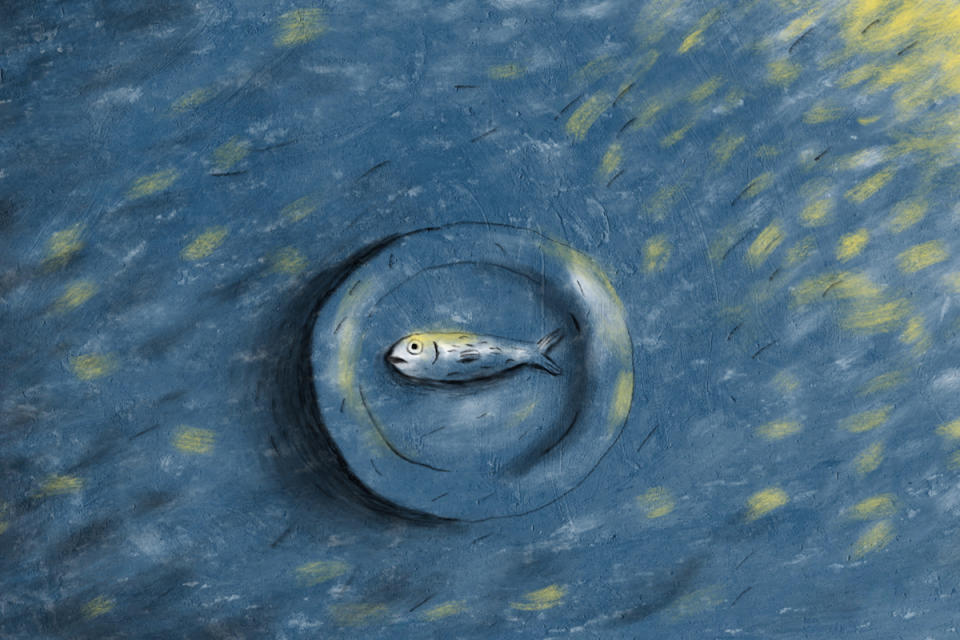
“Tie,” (“Elo,” Alexandra Ramires (Xá), 2020)
A 2020 Chicago Gold Hugo winner for best animated short, Tie” takes place under a gloomy sun and in high grass where a dog collapses and dies. A boy with a minute body literally bumps into a man with a minute head. They join forces, or bodies. Driven by surreal logic, a parable of survival and adaptation drawn with pencil on paper, the film marks yet another title from collaborators at Portugal’s Bando À Parte art pic powerhouse, six of whom – Ramires, Doutel, Sá, Mihajlovic, Gonçalves, Rocha, – direct titles in this selection.
“O Melhor da Rua,” (Artur Correia,” 1966)
Annecy’s 1967 Advertising Film Award laureate, Portugal’s first win at the festival. Running a mere 30 seconds this Schweppes ad is as follows – a bar owner entices his customers with a giant sign reading Town Bar. The rival establishment, opposite, renames their joint Europe Bar. So, the former puts World Bar, the rival puts Universe Bar, then all its customers flee to the original bar, winning with the unbeatable Bar Schweppes sign. Correia, born in 1932, had studied graphics at Castro in the 1950s and balanced his career between comics, animation and advertising.
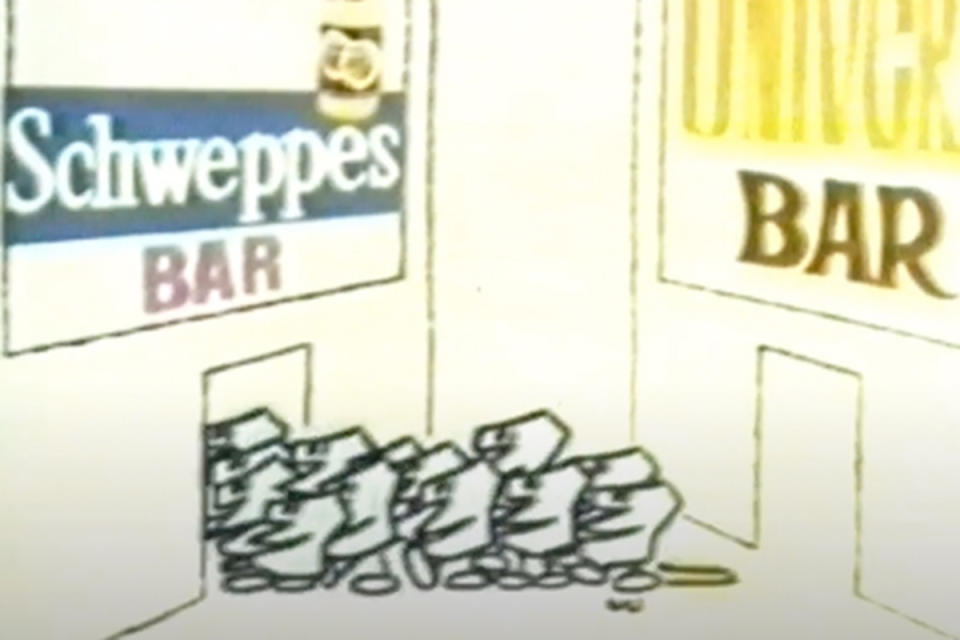
“Purpleboy,” (Alexandre Siquiera, 2019)
A Grand Prize winner at Brussels’ 2020 Anima Festival, among a slew of prizes, a fantasy gender identity adventure. Grain grows in his parents garden, wants to be a boy becoming a brave aviator like his father. Born in the body of a girl, he suffers persecution. A tragic event proves his salvation. Sluiced by magic realism and endowed with far larger narrative than most titles in this selection, made by Bando À Parte in association with Rainbow Productions, Ambiances, and Luna Blue Film.
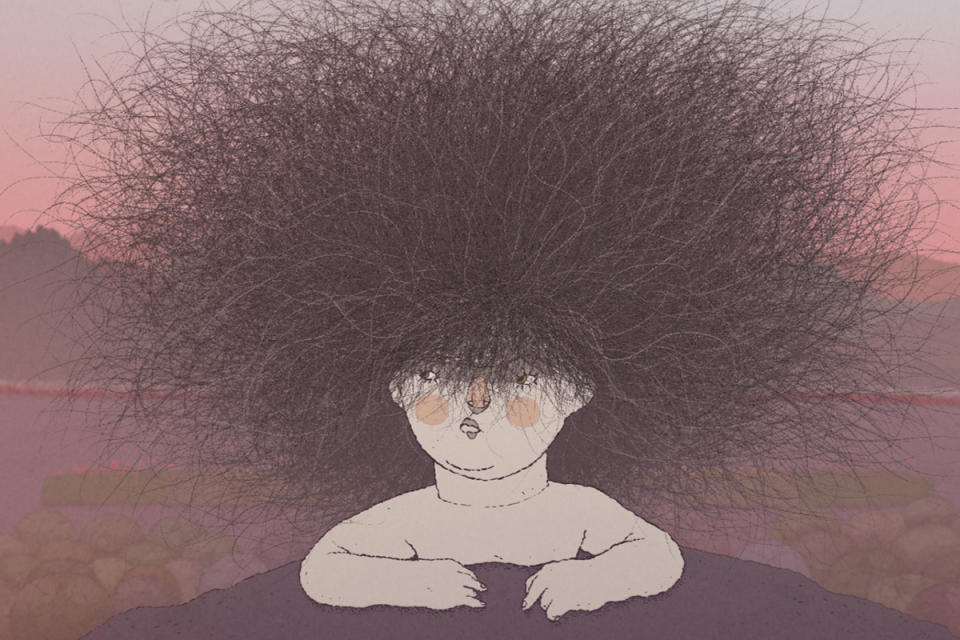
“Almost Forgotten,” (“Quase Me Lembro,” Miguel Lima, Dimitri Mihajlovic, 2023)
A woman tries to rebuild the story of her grandfather’s house, imagining she revisits it and explores its rooms in dim light. There she encounters her grandfather, an Angolan War vet still suffering PTSD, hearing words he spoke in her childhood: : “Promises, promises, it was all lies”; “it was kill or be killed.” The film builds to a dramatic, doubly violent climax. Made with 2D animation with analog painting over inkjet printings, mastering mood and memory, the short was a finalist at the 2024 Quirino Awards. BAP Animation Studios’ produced.
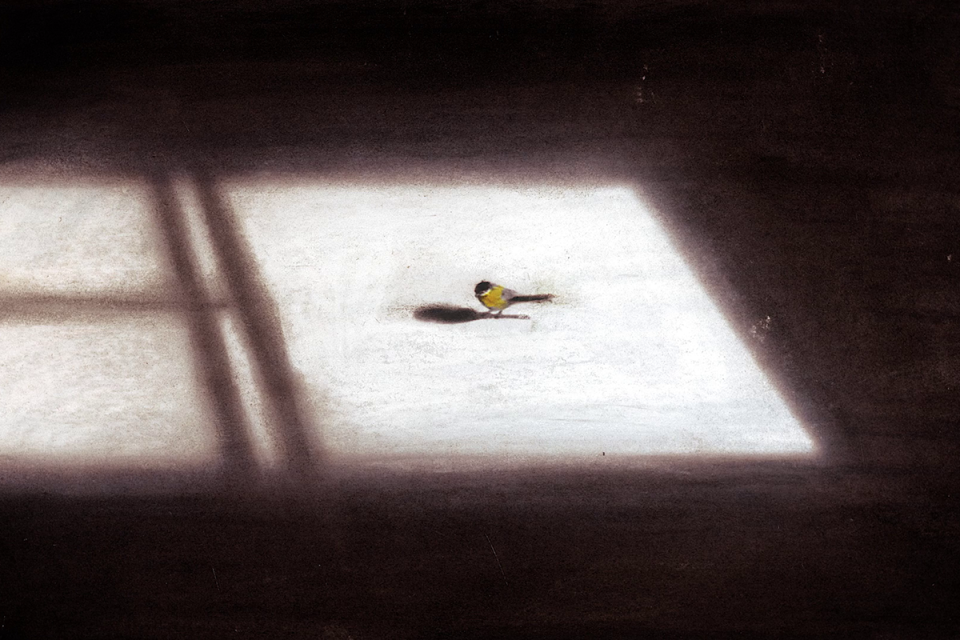
“Antonio María’s Nightmare,” (Joaquim Guerreiro, 1923)
Guerreiro’s pioneering spirit brought to life Portugal’s first animated short, released on Jan. 25, 1923. This two-minute film, since lost, caricatured then Prime Minister António Maria da Silva. Guerreiro also immortalized the short in a comic strip for Tiro Ao Alvo. The late 1990s saw the rediscovery of the original 150 drawings in a second-hand bookstore, allowing for a 2001 reconstruction, complete with a new soundtrack by António Victorino d’Almeida. The short sees the prime minister have a nightmare where Portugal’s proletariat are fulfilling their Bolshevik dream.
“Because This Is My Craft,” (Paulo Monteiro, 2018)
A homage made by first-person voiceover dedicated by Monteiro to his father who dazzled him as a child, he recalls, with his stories of his travels by plane and ship, exploits as a hockey and volleyball player, and anecdotes of sperm whaling in a small rowing boat with fishermen of the Azores’ Faial Island. As the narrator speaks, his child’s imagination recreates the scenes he once imagined with precise pencil-drawn black and white line animation infused by quaint fantasy. The film won best Portuguese short at the 2019 Monstra – Lisbon Film Festival.
“Between the Shadows,” (Alice Guimarães, Monica Santos, 2018)
A bored bank clerk whose clients pawn their hearts meets a tall dark stranger, who begs her help. Directed by Guimarães (“Amelia & Duarte”) and Mónica Santos (“The Pink Jacket”), a feminist fantasy film noir mixing real-life actors, stop-motion and a surreal big city background which scored a 2018 Cesar nomination in France and proved a fest favourite. From Portugal’s Animais, Um Minuto and France’s Vivamente Lundi!
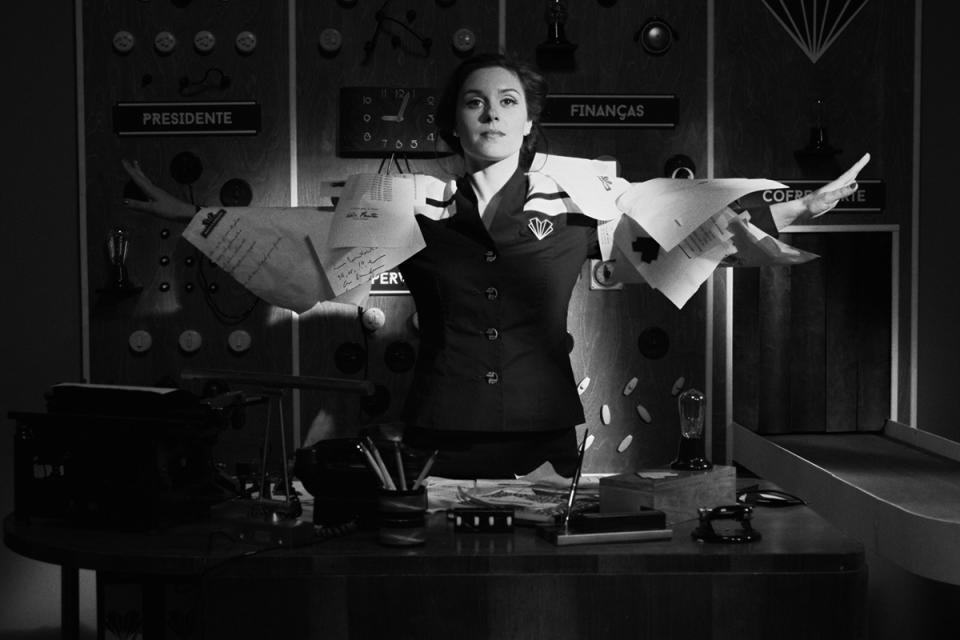
“Birds,” (Filipe Abranches, 2009)
In a surreal world a birdlike wizened lady tends to her caged birds, prepping a chicken stew, all soundtracked with chirps and a fitting dissonant soundtrack. Perhaps director Abranches has his parents to thank for buying “small bags filled with comics at the beach’s kiosk.” providing a steady supply of visual fodder to call upon. He has managed to balance animation, teaching, and comics, founding Umbra the independent Portuguese comic publisher.
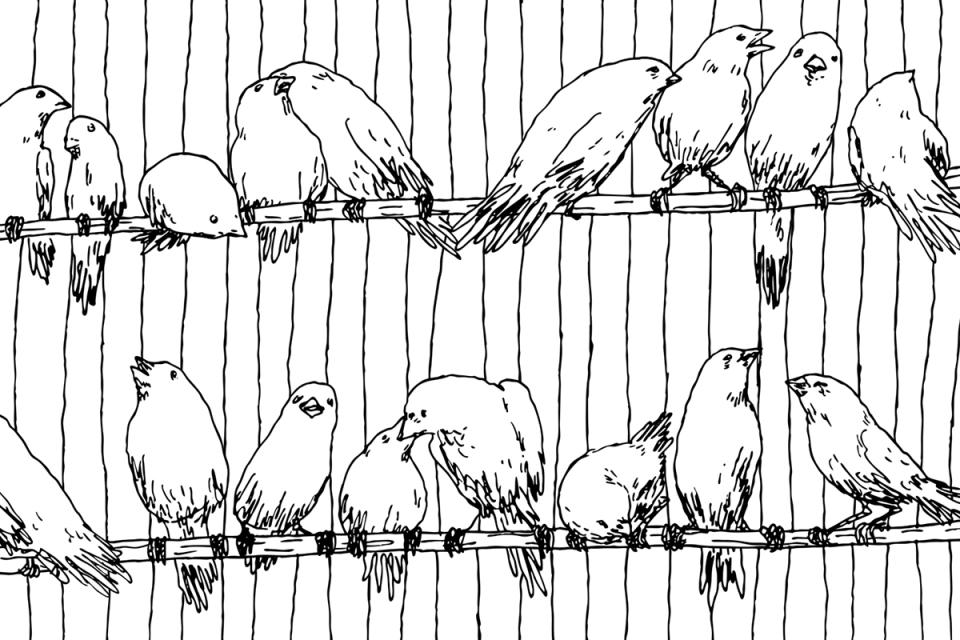
“Cold Soup,” (“Sopa Fria,” Marta Monteiro, 2023)
A 2024 Quirinos best animation design winner, in which a women remembers years of domestic abuse, tellingly drawn as just an outline in her memories as she recounts how at first she thought the failure of her marriage was just her fault. As scenes roll, drawn in kitsch greens and pinks, and years roll by, “when he lost his job, he was so stressed he would hit me,” she recounts. And background colors change to black or she imagines herself shut up in a glass cubicle. A pained and painful story.
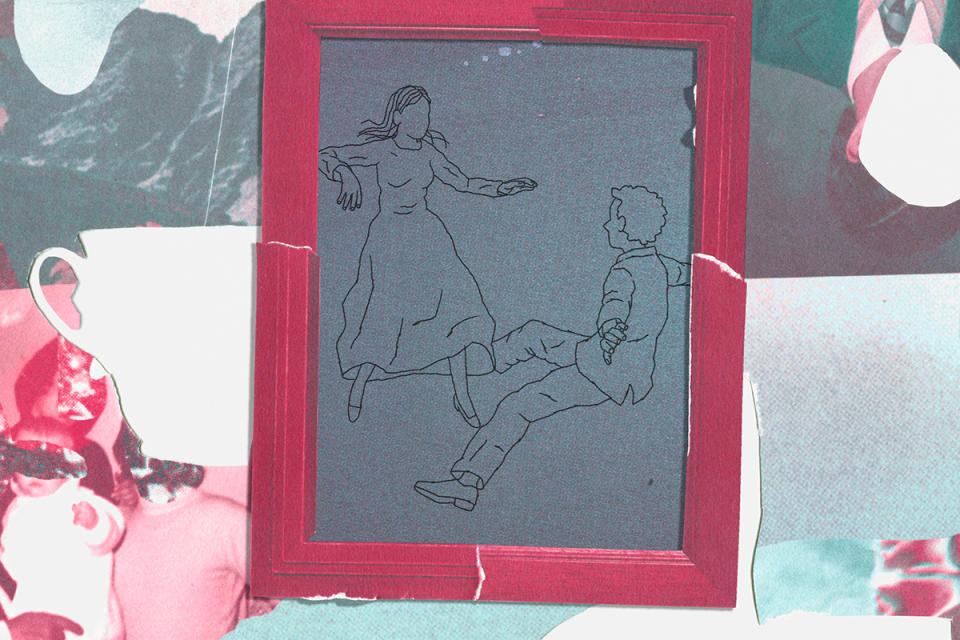
“The Sounds From the Drawers,” (“Das Gavetas Nascem Sons,” Vitor Hugo Rocha, 2017)
A 2017 breakthrough from the close circle of animators at Bando À Parte and now BAP Animation Studio. Here, the contents of a higgeldy-piggedly row of 42 wooden drawers gain life sparking abstract animation and short shards of memory, such as of a small boy peddling down a long corridor at a hellbent pace. The wood of the drawers is so well drawn you can almost smell it. Best experimental short at Lisbon’s 2018 Animation Monstra Festival.
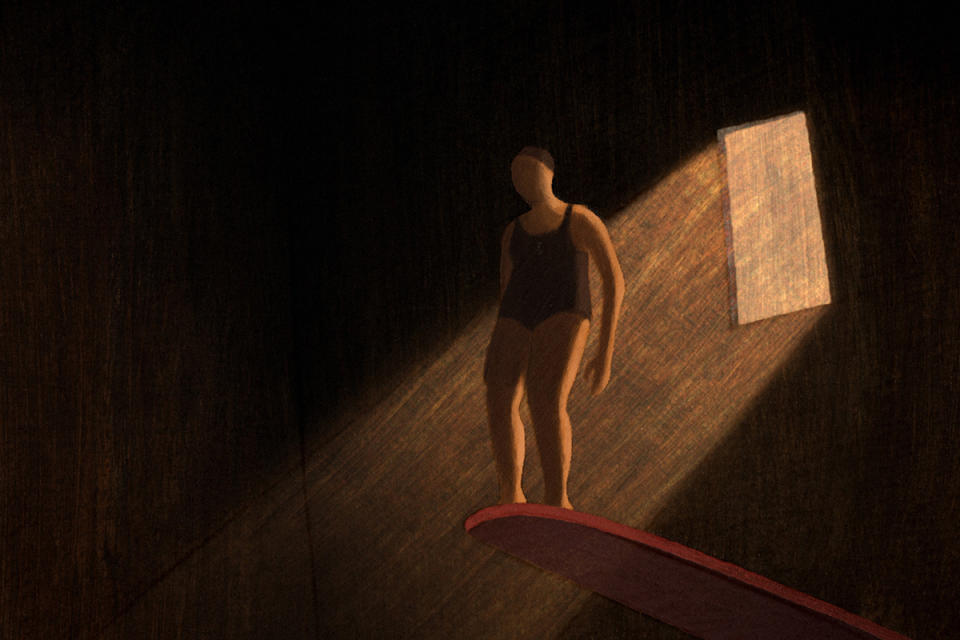
“Fado Do Homen Crescido,” (Pedro Brito, 2012)
The tension between the fanciful and the imaginative play out in a Lisbon tavern as a man sits in a state of reminiscence. We rattle through fragments of his memory from a childhood spent within the city. The joy of his footballing heroes in sticker albums, and the street kickabouts’ they inspired, are set against the backdrop of crime taking place alongside the day to day of clothes hanging to dry. Its 2D animation is colored bright with shades of pastel red used throughout.
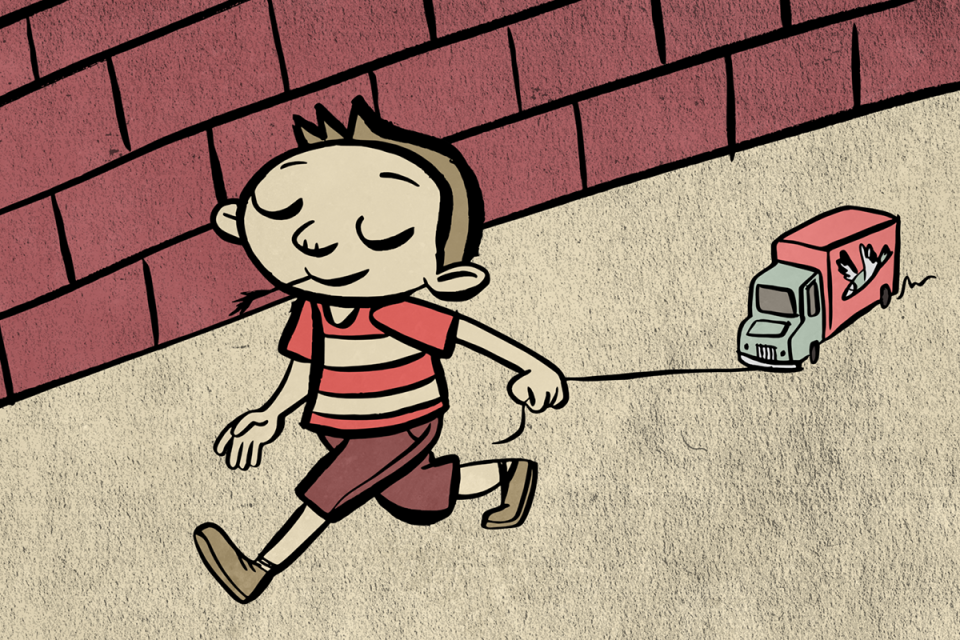
“Fragments,” (José Miguel Ribeiro, 2016)
Winner of Locarno’s Leopard of Tomorrow in 2016. In the pulsing arteries of an urban Portugal, amidst the excitement of the Euros semi final, Mario reconnects with his estranged father, who recounts a haunting war story. The narrative intertwines past and present, exploring generational anger and trauma. “You were an introverted child. You didn’t speak much…I spoke too much it seems” the father admits to Mario. Directed by Ribeiro, this 2D, stop-motion, and live-action mix shows the techniques and talent he’d take on to his Annecy competition title, the feature “Nayola.”
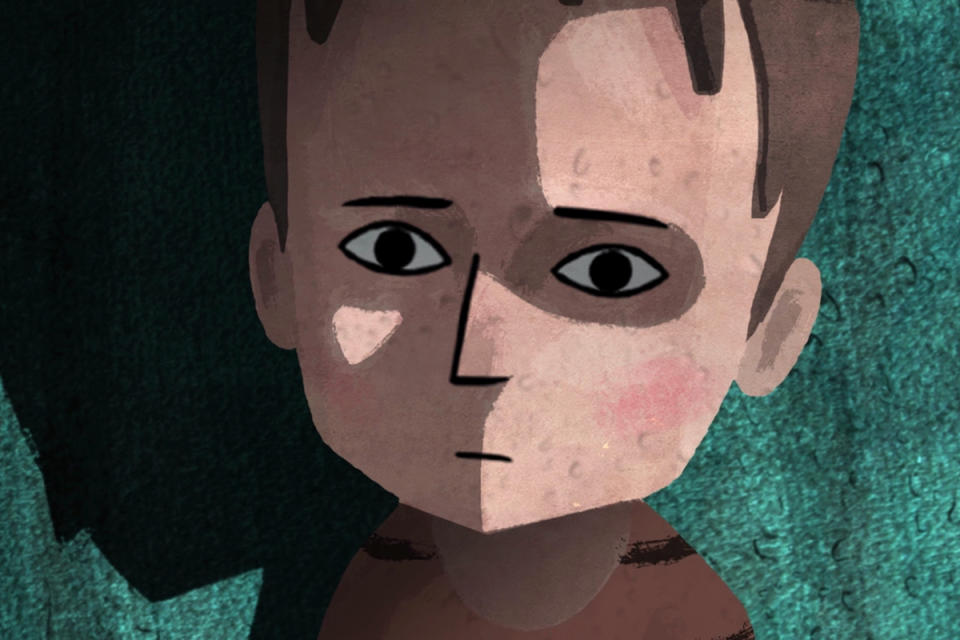
“A Mind Sang,” (“A Mãe De Sangue,” Vier Nev, 2019)
A piece of virtuouso filmmaking from Nev, who mostly works on VR projects, which won Vimeo Staff Pick Award at 2020’s Annecy. The tour-de-force animation presents images that can be seen two ways, telling a story of couples kissing, coupling and the blood and violence of birth. Meanwhile, am outlined hand is also a man, a face contains two hands, there is a screen of faces or foetuses, two faces compose together the body of a woman, and a foetus tipped upside down becomes a cat in a gothic garden scape. Drawn in broad black and white strokes with a striking use of red for fire and blood accompanied by a moody ‘50s psychological thriller orchestral score.

“Stuart,” (Zepe (José Pedro Cavalheiro), 2006)
A jazz soundtrack lilts as we are swept in perpetual motion through the Lisbon alleyways beloved by artist Stuart de Carvalhais. This is an homage chasing after his graphic work. Hand drawn in an often boiling black and white, there is a film noir feel as the shadow of Stuart de Carvalhais’ hat adorned figure looms throughout. Cavalheiro, also known as Zepe, teaches extensively and his fascination with the illusion of movement has influenced many.
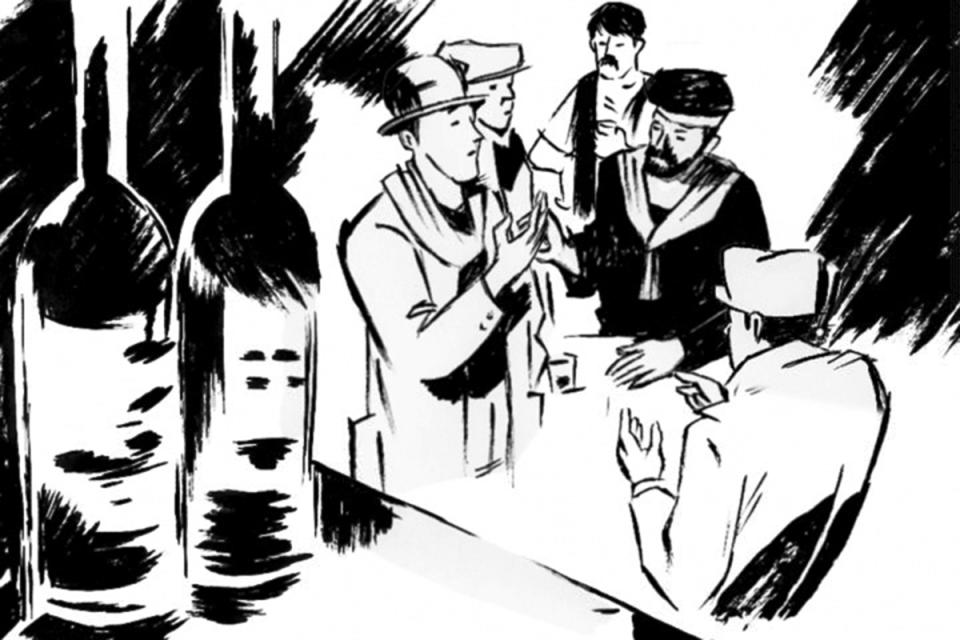
Best of Variety
Sign up for Variety’s Newsletter. For the latest news, follow us on Facebook, Twitter, and Instagram.


